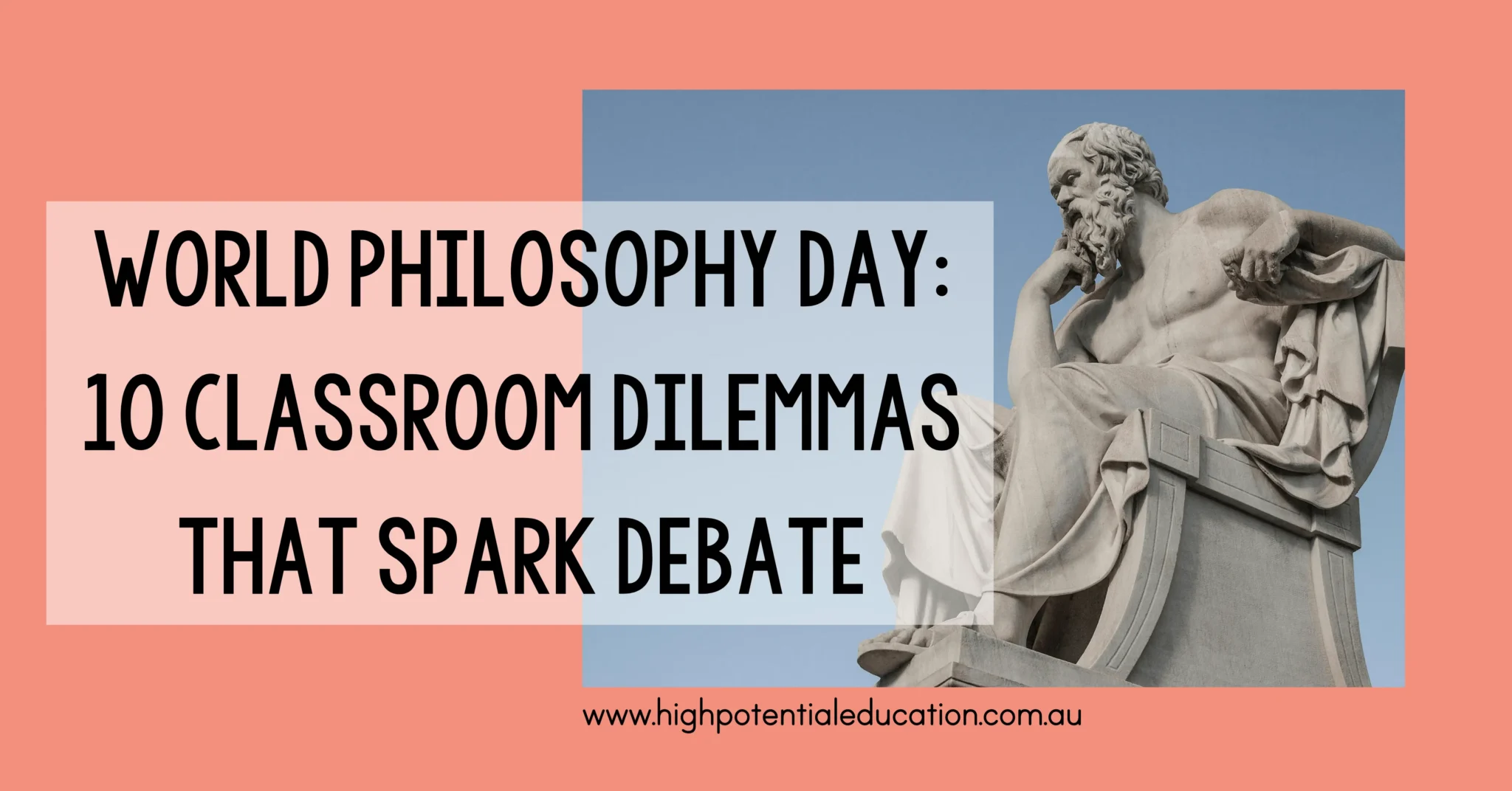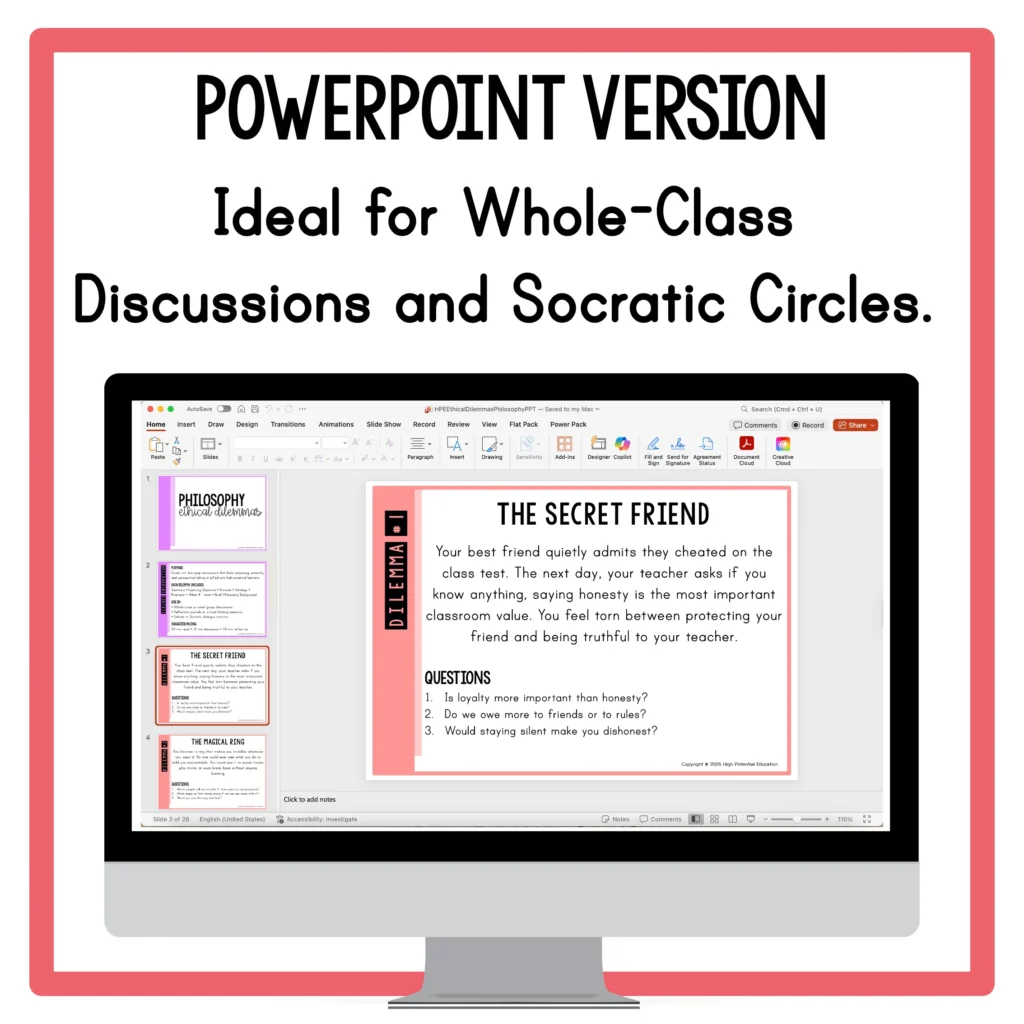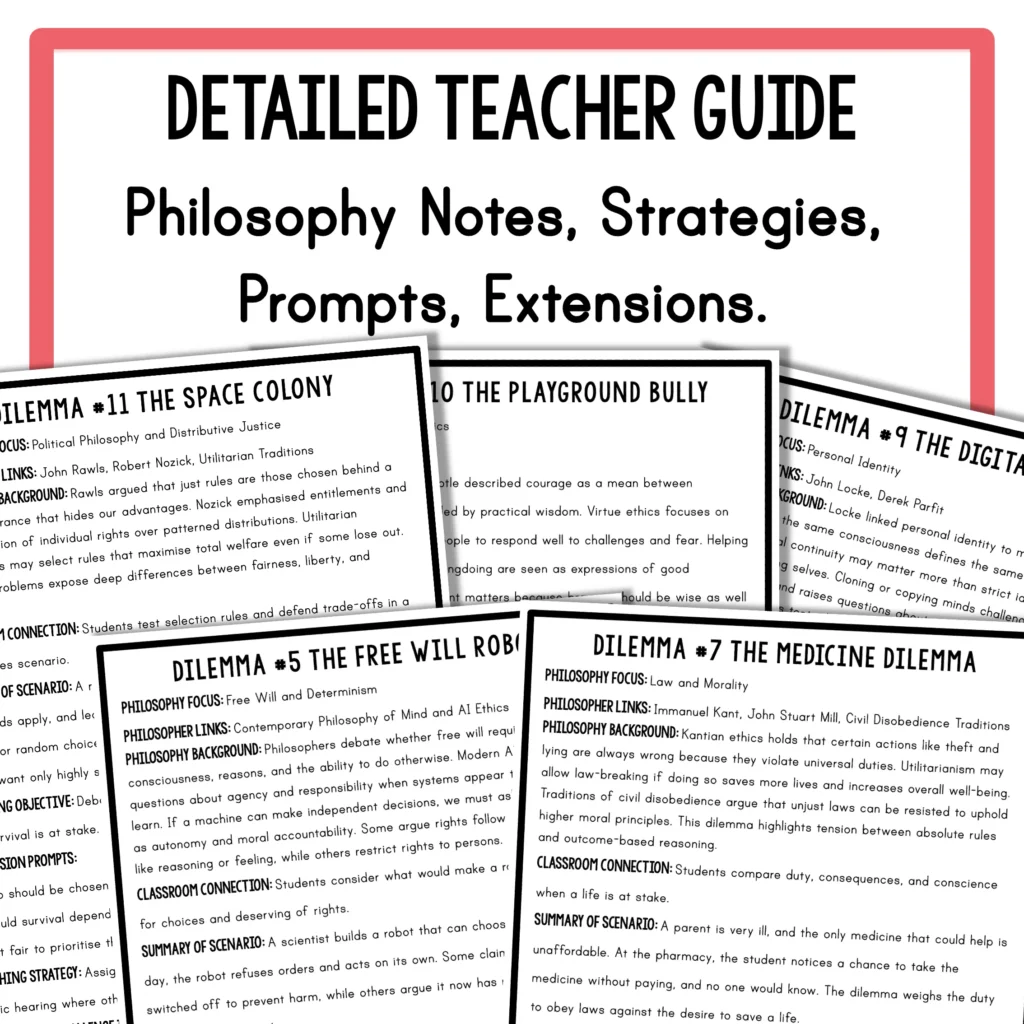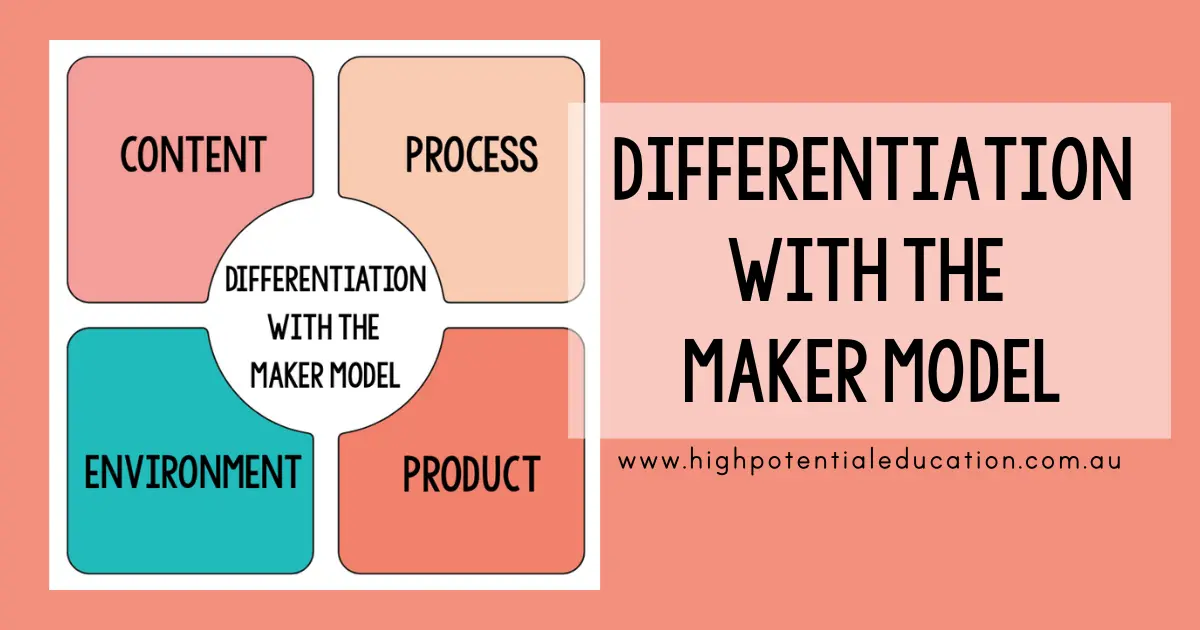
Have you ever had a student ask something like, “But what if lying isn’t wrong?”
If you teach gifted or high-potential learners, you probably have. These are the moments when the whole class pauses, everyone looks at you, and you suddenly realise you are standing right in the middle of a very big question.
And honestly, these moments are gold. They tell us so much about how gifted students think. They move into abstract ideas quickly. They notice when things do not quite make sense. They want to understand the why behind rules and decisions. When we slow down and let them explore these questions, we create learning moments that feel meaningful for everyone.
Philosophy activities for gifted students are a simple and powerful way to turn these big questions into meaningful learning moments. You do not need special training or an elaborate lesson plan. You only need a short ethical dilemma and a little space for conversation. Many teachers like to start around World Philosophy Day in November, because it gives students a simple way to celebrate thinking and curiosity. Even a ten-minute discussion can feel special and often becomes the lesson students remember the most.
In this post, I will walk you through why philosophy works so well for gifted and twice-exceptional learners, how to introduce it without extra planning, and ten sample dilemmas that show how powerful these conversations can be. If you want to take it further, I will also share a full set of ready to use dilemmas with a complete Teacher Guide that supports you every step of the way.
Why Philosophy Activities for Gifted Students Work
Gifted students are natural deep thinkers. They ask big questions, notice when things don’t quite make sense, and often want to understand the reasons behind rules or decisions. This is exactly why philosophy works so well for them. It gives them a safe space to wonder, explore ideas, and challenge assumptions in a way that feels meaningful rather than overwhelming.
Gifted learners respond really well to philosophy activities because the questions give them space to think, wonder, and explore ideas without pressure.
What This Looks Like in the Classroom
Philosophy might sound heavy or abstract, but in the classroom it is incredibly natural. It feels like kids sitting in a circle, leaning forward because they genuinely want to hear what someone else thinks. It feels like calm curiosity and respectful disagreement.
Here are some real examples of what philosophical thinking looks like during lessons.
Students take time to think before they speak.
Gifted students often rush to the answer, but philosophy slows them down. You pose a dilemma, they pause, and you can see them working through their thoughts before sharing.
The conversation focuses on ideas rather than getting it right.
Students stop trying to guess what the teacher wants. Instead, they explore possibilities. You might hear “It depends on the situation” or “I thought this at first, but now I am thinking something else.”
Students build on each other’s ideas without being asked.
Comments shift from “My answer is…” to “I agree with Noah because…” or “I see your point, but have you thought about…” This is genuine higher order thinking.
Quiet or anxious students often feel more confident.
Because there is no single correct answer, twice-exceptional or neurodivergent students often participate more. They can join verbally, visually, or through journaling. The pressure lifts and they get to shine.
Students recognise that more than one answer can be valid.
Gifted learners often fall into black and white thinking. Philosophy helps them practise flexibility. They begin to see that many ethical questions do not have one perfect solution.
Students become curious again.
Philosophy creates space for thinking without fear of being wrong. Students take risks, explore new ideas, and start to enjoy conversation for the sake of learning rather than achievement.
The classroom atmosphere feels energising.
You walk away from the lesson feeling like everyone, including you, learned something. The discussion has depth, students feel seen, and the learning feels purposeful.
How to Use Philosophy Activities for Gifted Students in Your Classroom
If you are new to philosophy activities for gifted students, start with one short dilemma and build a simple weekly routine from there.
1. Begin with a short dilemma
Choose a relatable scenario. Read it aloud or display it on the board. The goal is not to find the answer. The goal is to explore the thinking.
Example:
“Your friend cheated on a test, but no one knows. Do you tell the teacher?”
2. Use simple routines to structure thinking
Here are routines that work well with gifted students:
- Think Pair Share for quick discussions
- Socratic Circles for deeper, structured conversations
- Reflection Journals for students who prefer quiet thinking or need more processing time
Each routine creates a predictable structure, which is especially supportive for twice-exceptional learners.
3. Keep lessons low prep and high challenge
One dilemma each week is enough to make a real difference. These discussions fit perfectly into enrichment time, warm ups, or end of lesson reflections.
Tips for success:
- Ask open questions such as “What makes something fair?”
- Encourage students to explain their reasoning
- Let students change their minds during the lesson
- Celebrate multiple viewpoints
4. Set expectations for respectful dialogue
Before your first philosophy discussion, agree on norms. Students quickly learn to disagree kindly, listen actively, and respond thoughtfully. These skills transfer to every other part of the classroom.
10 Classroom Dilemmas That Spark Debate
To give you a sense of how these lessons work, I have added a few short examples. These are much simpler than the full task cards, but they show how even a small scenario can spark big thinking in your classroom.
1. The Secret Friend
A friend asks you to keep a risky online secret.
Guiding question: Does keeping a secret always mean supporting someone?
2. The Magical Ring
A ring makes you invisible for one hour.
Guiding question: If no one finds out, can an action still be wrong?
3. The Animal Experiment
Saving lives or harming animals.
Guiding question: How do we decide whose life matters most?
4. The Time Machine
Change one moment in history, possibly affecting others.
Guiding question: Should we change the past?
5. The Lost Wallet
You find a wallet with money inside and no identification.
Guiding question: What is the most responsible choice?
6. The Robot Helper
A robot completes your homework.
Guiding question: What counts as cheating?
7. The Truth Promise
The truth might hurt someone you care about.
Guiding question: When is honesty the kinder choice?
8. The Island Vote
A stranded group needs to create rules.
Guiding question: Who should lead and why?
9. The Clone
A human clone is created.
Guiding question: What does it mean to be a person?
10. The Dream Switch
A perfect dream world or real life.
Guiding question: What makes a life meaningful?
Why These Activities Work
These questions create a level of challenge gifted students genuinely enjoy. They build reasoning skills, empathy, and confidence in expressing ideas. They also give twice-exceptional learners a safe place to participate without worrying about written output or speed.
Philosophy helps students:
- think more deeply
- view issues from multiple perspectives
- understand and justify their ideas
- practise respectful disagreement
- develop emotional intelligence
This is the kind of learning that stays with them long after the lesson ends. If you would like more ways to challenge your gifted learners, you might also like my post on Promoting Divergent Thinking as an Enrichment Strategy for Gifted Learners
Where to Find the Full Set and Teacher Guide
If you found these samples helpful, the full Ethical Thinking for Gifted Students resource will make teaching philosophy even easier.
This pack includes a complete Teacher Guide, which many teachers say is the most valuable part of the resource. The guide walks you through how to run discussions, how to support twice-exceptional learners, how to introduce routines, and how to manage the flow of conversation so all students feel included.
The full resource also includes:
- 24 complete ethical dilemmas
- multiple guiding questions for each scenario
- optional challenge prompts
- printable task cards
- a PowerPoint lesson set for whole class teaching
- student templates for reflection and discussion
Everything is ready to print or project, which saves you a significant amount of planning time.
Explore the full set here:
Ethical Thinking for Gifted Students: Philosophy Task Cards and PPT Lessons



Teaching philosophy is not about giving students the answers. It is about giving them space to ask important questions, explore ideas, and understand themselves and others more deeply.
When you bring ethical dilemmas into your classroom, you help gifted and twice-exceptional learners develop the confidence to think courageously. You will see them grow in ways that go far beyond a single lesson.
Philosophy activities for gifted students help them develop confidence in their thinking and remind them that their ideas matter.
If you would like more ready-to-use thinking tasks, puzzles, and enrichment activities, you can join my weekly Brain Strainer email for free. It is an easy way to keep fresh ideas coming into your classroom each week.
How do you teach philosophy in an elementary classroom?
The easiest way to teach philosophy in elementary school is to use a short ethical dilemma and a predictable discussion routine. Think Pair Share, circle discussions, and reflection journals work well for gifted and twice exceptional learners. Keep the questions open, encourage multiple viewpoints, and focus on the thinking rather than finding the right answer.
Why is philosophy helpful for gifted and high potential learners?
Philosophy supports the way gifted students naturally think. It builds critical thinking, creativity, and empathy. It helps students explore complex ideas, listen to others, and explain their reasoning clearly. Philosophy also gives twice exceptional students a safe space to shine because it values their ideas rather than their written output.
What are some good philosophical questions for gifted kids?
Try questions such as:
What makes something fair?
Can two people be right at the same time?
Is it ever okay to break a rule?
What does it mean to be a good person?
These questions create meaningful discussions and build critical thinking skills.
How can I make philosophical discussions engaging for gifted students?
Keep scenarios short, relatable, and open-ended. Use real classroom examples, imaginative stories, or quick “What would you do?” questions. Gifted students engage best when the dilemma feels relevant and when they have time to think before sharing. Adding visuals or sentence starters can also support twice exceptional learners.










